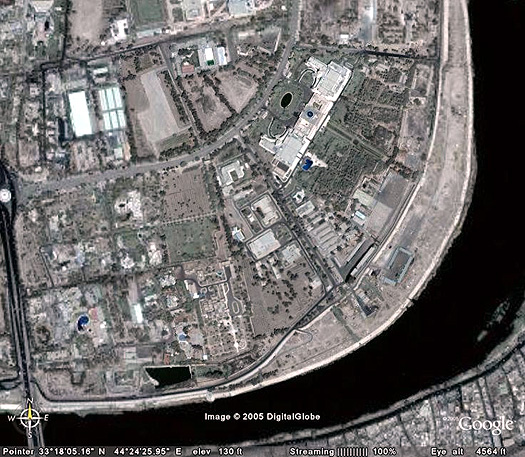Topic: The Media
What's The News? What You Want It To Be.
Last weekend in Just Above Sunset there were six paragraphs on how the news is, almost entirely, a commercial venture, and on the implications of what that means about what gets reported, and how it gets reported. That was the opening of Non-Stories, and the argument was that the news folks don't choose the news, the market does, with a few exceptions.
Now Richard A. Posner is a judge on the United States Court of Appeals for the Seventh Circuit, and a senior lecturer at the University of Chicago Law School, and in a New York Times item they will publish next Sunday - Bad News - the judge makes the authoritative argument for this idea. It's far longer than six paragraphs, and far better than the six in these pages. A friend who has often argued before Posner in Seventh Circuit appeals court tells me the guy is flat-out brilliant, and can be pretty brutal - but fair. (She didn't say the same thing about Scalia after arguing a few times before him down in Washington.)
In the Posner article to be published on 31 July (available early on the web if you know where to look) the judge is addressing how the conventional news media are "embattled." With books attacking them from both the left and the right, and this scandal or that, and being challenged by "upstart bloggers" – and with their audience in decline and "their credibility with the public in shreds" - well, it's a mess. Posner covers the polling data. It's not pretty, and he points out that most everyone sees the problem - thirty years ago news reporting was dominated by newspapers and by television network news, and audiences for these have declined. There's competition - cable television and the web. And things have turned partisan.
Posner points out this may mean the end of newspapers, if not most traditional news media, and this journalism thing:
Of course Posner is arguing that the media is controlled by liberals, and he doesn't like it much. But the twist is that the news media is full of liberals for reasons having to do with the economics of the marketplace.The audience decline is potentially fatal for newspapers. Not only has their daily readership dropped from 52.6 percent of adults in 1990 to 37.5 percent in 2000, but the drop is much steeper in the 20-to-49-year-old cohort, a generation that is, and as it ages will remain, much more comfortable with electronic media in general and the Web in particular than the current elderly are.
At this point the diagnosis splits along political lines. Liberals, including most journalists (because most journalists are liberals), believe that the decline of the formerly dominant ''mainstream'' media has caused a deterioration in quality. They attribute this decline to the rise of irresponsible journalism on the right, typified by the Fox News Channel (the most-watched cable television news channel), Rush Limbaugh's radio talk show and right-wing blogs by Matt Drudge and others. But they do not spare the mainstream media, which, they contend, provide in the name of balance an echo chamber for the right. To these critics, the deterioration of journalism is exemplified by the attack of the ''Swift boat'' Vietnam veterans on Senator John Kerry during the 2004 election campaign. The critics describe the attack as consisting of lies propagated by the new right-wing media and reported as news by mainstream media made supine by anxiety over their declining fortunes.
Critics on the right applaud the rise of the conservative media as a long-overdue corrective to the liberal bias of the mainstream media, which, according to Jim A. Kuypers, the author of ''Press Bias and Politics,'' are ''a partisan collective which both consciously and unconsciously attempts to persuade the public to accept its interpretation of the world as true.'' ...
No left-wing conspiracy against the patriotic God-fearing real Americans? It seems not.The mainstream media are predominantly liberal - in fact, more liberal than they used to be. But not because the politics of journalists have changed. Rather, because the rise of new media, itself mainly an economic rather than a political phenomenon, has caused polarization, pushing the already liberal media farther left.
So what happened? He argues there has been a "vertiginous decline in the cost of electronic communication" and "the relaxation of regulatory barriers to entry." This led to a whole lot more choice. Thirty years ago the average number of television channels that Americans could receive was seven; today, with the rise of cable and satellite television, it is seventy-one, and thirty years ago there was no internet, therefore no web, thus no online newspapers and magazines, and of course no blogs. Things changed.
Posner asks us to consider a town that before television came along, or even before, radio had just two newspapers. Why just two? Economies of scale made it impossible for a newspaper with a small circulation to break even. So the two, to stay in business, played to the middle:
Clear enough. That's easy to see.Each of the two, to increase its advertising revenues, would try to maximize circulation by pitching its news to the median reader, for that reader would not be attracted to a newspaper that flaunted extreme political views. There would be the same tendency to political convergence that is characteristic of two-party political systems, and for the same reason - attracting the least committed is the key to obtaining a majority.
One of the two newspapers would probably be liberal and have a loyal readership of liberal readers, and the other conservative and have a loyal conservative readership. That would leave a middle range. To snag readers in that range, the liberal newspaper could not afford to be too liberal or the conservative one too conservative. The former would strive to be just liberal enough to hold its liberal readers, and the latter just conservative enough to hold its conservative readers. If either moved too close to its political extreme, it would lose readers in the middle without gaining readers from the extreme, since it had them already.
But then cost conditions change. Imagine what happens as it gets cheaper to publish. The liberal newspaper has to worry that diluting its message, in an effort to attract moderates, could cause it to lose its most liberal readers to a new, more liberal newspaper. They've lost their secure base. And the same thing the other way - by the same process the conservative newspaper more conservative.
Such things happen when it gets cheaper and easier to publish.
And that's what's happening now:
But wait! There's more! This change in the cost of doing business creates more crap - the endless coverage of Michael Jackson or the missing lass in Aruba and that sort of thing - and all the talk shows with pundits shouting at each other -The current tendency to political polarization in news reporting is thus a consequence of changes not in underlying political opinions but in costs, specifically the falling costs of new entrants. The rise of the conservative Fox News Channel caused CNN to shift to the left. CNN was going to lose many of its conservative viewers to Fox anyway, so it made sense to increase its appeal to its remaining viewers by catering more assiduously to their political preferences.
Be that as it may, Posner's main thesis - competition increases polarization - is interesting in that it assumes that liberals want to read liberal newspapers and conservatives conservative ones.The tendency to greater sensationalism in reporting is a parallel phenomenon. The more news sources there are, the more intense the struggle for an audience. One tactic is to occupy an overlooked niche - peeling away from the broad-based media a segment of the consuming public whose interests were not catered to previously. That is the tactic that produces polarization. Another is to ''shout louder'' than the competitors, where shouting takes the form of a sensational, attention-grabbing discovery, accusation, claim or photograph. According to James T. Hamilton in his valuable book ''All the News That's Fit to Sell,'' this even explains why the salaries paid news anchors have soared: the more competition there is for an audience, the more valuable is a celebrity newscaster.
Lots of people say that we consume news and opinion in order to become well informed about public issues. Yeah, right. Posner points out that if that were true -
So folks want the news equivalent of comfort food. The world is a scary place.? liberals would read conservative newspapers, and conservatives liberal newspapers, just as scientists test their hypotheses by confronting them with data that may refute them. But that is not how ordinary people (or, for that matter, scientists) approach political and social issues. The issues are too numerous, uncertain and complex, and the benefit to an individual of becoming well informed about them too slight, to invite sustained, disinterested attention. Moreover, people don't like being in a state of doubt, so they look for information that will support rather than undermine their existing beliefs. They're also uncomfortable seeing their beliefs challenged on issues that are bound up with their economic welfare, physical safety or religious and moral views.
So why do people "consume" news and opinion?
As Rick, our News Guy in Atlanta, says, it's always a balance - between what should be reported in a democracy (people really need to know this), and what people want to hear about (people really want to know that). Our columnist Bob Patterson call she former "Broccoli News" - as in "Eat your broccoli, it's good for you - and stop making faces!"In part it is to learn of facts that bear directly and immediately on their lives - hence the greater attention paid to local than to national and international news. They also want to be entertained, and they find scandals, violence, crime, the foibles of celebrities and the antics of the powerful all mightily entertaining. And they want to be confirmed in their beliefs by seeing them echoed and elaborated by more articulate, authoritative and prestigious voices. So they accept, and many relish, a partisan press. Forty-three percent of the respondents in the poll by the Annenberg Public Policy Center thought it ''a good thing if some news organizations have a decidedly political point of view in their coverage of the news.''
Being profit-driven, the media respond to the actual demands of their audience rather than to the idealized ''thirst for knowledge'' demand posited by public intellectuals and deans of journalism schools. They serve up what the consumer wants, and the more intense the competitive pressure, the better they do it.
How to disguise the awful taste of broccoli? Make a contest of everything - seeing this or that as something like a sports competition. That how we cover almost all political matters - news coverage of a political campaign is designed for a public that enjoys competitive sports, not to one that is civic-minded. Civic-minded stuff is so boring.
So we have a media that is increasingly, and inevitably, polarized, and pumping of sensational tabloid silliness. And no one is now talking about raising people's consciousness and elevating public discourse.
A problem? Maybe not.
It's a "market" thing.Does this mean that the news media were better before competition polarized them? Not at all. A market gives people what they want, whether they want the same thing or different things. Challenging areas of social consensus, however dumb or even vicious the consensus, is largely off limits for the media, because it wins no friends among the general public. The mainstream media do not kick sacred cows like religion and patriotism.
Not that the media lie about the news they report; in fact, they have strong incentives not to lie. Instead, there is selection, slanting, decisions as to how much or how little prominence to give a particular news item.
But what about those journalists fighting for truth, justice and the American way - willing to go to jail to protect their sources and all the rest?
They need to get real -
Yep, that civic-minded hard-news policy-wonk stuff is so elitist, isn't it?Journalists are reluctant to confess to pandering to their customers' biases; it challenges their self-image as servants of the general interest, unsullied by commerce. They want to think they inform the public, rather than just satisfying a consumer demand no more elevated or consequential than the demand for cosmetic surgery in Brazil or bullfights in Spain. They believe in ''deliberative democracy'' - democracy as the system in which the people determine policy through deliberation on the issues. In his preface to ''The Future of Media'' (a collection of articles edited by Robert W. McChesney, Russell Newman and Ben Scott), Bill Moyers writes that ''democracy can't exist without an informed public.'' If this is true, the United States is not a democracy (which may be Moyers' dyspeptic view). Only members of the intelligentsia, a tiny slice of the population, deliberate on public issues.
As for the facts of what's happening in the world, the idea here is "the public's interest in factual accuracy is less an interest in truth than a delight in the unmasking of the opposition's errors." Who needs facts?
It's a business, after all, and no business wants to offend a customer.The limited consumer interest in the truth is the key to understanding why both left and right can plausibly denounce the same media for being biased in favor of the other. Journalists are writing to meet a consumer demand that is not a demand for uncomfortable truths.
Bu the business is in trouble, from "the latest, and perhaps gravest, challenge to the journalistic establishment." The BLOG!
Note this:
Oh my! Posner says that, in effect, blogosphere is a collective enterprise - not twelve million separate enterprises, but one enterprise with twelve million reporters, feature writers and editorialists, yet with almost no costs. It's as if The Associated Press or Reuters had millions of reporters, many of them experts, all working with no salary for free newspapers that carried no advertising.Journalists accuse bloggers of having lowered standards. But their real concern is less high-minded - it is the threat that bloggers, who are mostly amateurs, pose to professional journalists and their principal employers, the conventional news media. A serious newspaper, like The Times, is a large, hierarchical commercial enterprise that interposes layers of review, revision and correction between the reporter and the published report and that to finance its large staff depends on advertising revenues and hence on the good will of advertisers and (because advertising revenues depend to a great extent on circulation) readers. These dependences constrain a newspaper in a variety of ways. But in addition, with its reputation heavily invested in accuracy, so that every serious error is a potential scandal, a newspaper not only has to delay publication of many stories to permit adequate checking but also has to institute rules for avoiding error - like requiring more than a single source for a story or limiting its reporters' reliance on anonymous sources - that cost it many scoops.
Blogs don't have these worries. Their only cost is the time of the blogger?. Having no staff, the blogger is not expected to be accurate. Having no advertisers (though this is changing), he has no reason to pull his punches. And not needing a large circulation to cover costs, he can target a segment of the reading public much narrower than a newspaper or a television news channel could aim for. He may even be able to pry that segment away from the conventional media. Blogs pick off the mainstream media's customers one by one, as it were.
And bloggers thus can specialize in particular topics to an extent that few journalists employed by media companies can, since the more that journalists specialized, the more of them the company would have to hire in order to be able to cover all bases. A newspaper will not hire a journalist for his knowledge of old typewriters, but plenty of people in the blogosphere have that esoteric knowledge, and it was they who brought down Dan Rather. Similarly, not being commercially constrained, a blogger can stick with and dig into a story longer and deeper than the conventional media dare to, lest their readers become bored. It was the bloggers' dogged persistence in pursuing a story that the conventional media had tired of that forced Trent Lott to resign as Senate majority leader.
What really sticks in the craw of conventional journalists is that although individual blogs have no warrant of accuracy, the blogosphere as a whole has a better error-correction machinery than the conventional media do. The rapidity with which vast masses of information are pooled and sifted leaves the conventional media in the dust. Not only are there millions of blogs, and thousands of bloggers who specialize, but, what is more, readers post comments that augment the blogs, and the information in those comments, as in the blogs themselves, zips around blogland at the speed of electronic transmission.
How can the conventional news media hope to compete? It's not even fair.
Oh drat, now I feel so? dirty?The bloggers are parasitical on the conventional media. They copy the news and opinion generated by the conventional media, often at considerable expense, without picking up any of the tab. The degree of parasitism is striking in the case of those blogs that provide their readers with links to newspaper articles. The links enable the audience to read the articles without buying the newspaper. The legitimate gripe of the conventional media is not that bloggers undermine the overall accuracy of news reporting, but that they are free riders who may in the long run undermine the ability of the conventional media to finance the very reporting on which bloggers depend.
But, Posner asks, are the people less well served than in the old days?
Surveys show that serious magazines have held their own and that serious broadcast outlets, "including that bane of the right, National Public Radio," are attracting ever larger audiences. And there's that tiny, tiny group that invites challenges to its biases - reading The New York Times along with The Wall Street Journal, watching CNN and Fox, that reads Brent Bozell and Eric Alterman and everything in between. For them, Posner suggests, the increased polarization of the media "provides a richer fare" than ever before.
Yeah, it does. But who has the time?
Posner ends with "maybe there isn't much to fret about."
He took a lot of words to tell us not to worry.
By the way, Eric Alterman - that fellow who wrote the book What Liberal Media - provided the link to this Posner article (here) commenting he is in the middle of writing a six hundred word reply to Posner for the Sunday Times. Alterman has opposed Posner before, as in this.
And ironically, Richard Posner has a blog, written the Nobel Prize winning economist Gary Becker, The Becker-Posner Blog.
Posted by Alan at 21:14 PDT
|
Post Comment |
Permalink
Updated: Monday, 25 July 2005 21:17 PDT
home








